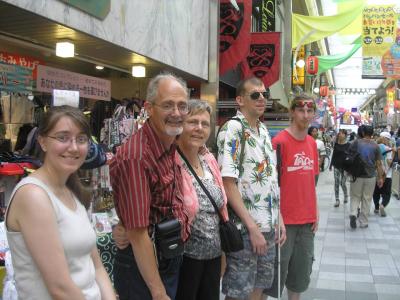CIU Students Join Professor on Sabbatical Trip

On the streets of Japan (l to r): CIU seminary student Elizabethe Johnson, Professor Dr. David Cashin, Cashin's wife Margareta,undergraduate student Garrett Mosley and undergraduate student Steven Tatlow
Even though Dr. David Cashin is on sabbatical, the Columbia International University professor of Intercultural Studies keeps on teaching. Three CIU students have joined Cashin on a trip to Japan where they are meeting the Japanese people and studying the culture. Cashin is also lecturing at a Japanese seminary where he leads courses on cultures and worldviews and Introduction to Islam, which includes a visit to a local mosque.
Below is a blog post from Cashin as he ponders Japan’s deepest need: Jesus Christ.
ADMIRAL PERRY, CHURCH PLANTING AND HIKIKOMORI
I have been reading a fascinating book on Japan and its faltering economy and culture entitled Shutting out the Sun, by Zielenziger. It describes the various ways Japanese culture seems to be failing, economically and sociologically. The economic growth rate on average has been under one percent for 15 years. Japan’s birthrate is the lowest in the industrialized world and the population has been shrinking since 2005. Japan suffers one of the highest suicide rates in the world and one to two million mostly young men have become recluses in their own homes, called the “hikikomori” or “withdrawn ones.”
In 1853 the American Admiral Perry forced the “hermit kingdom” into the modern world. For 47 years after this opening Protestant missionaries worked in Japan with considerable success. An average of 5,000 people were baptized every year. But Japan remained a very mono-ethnic and intensively group-oriented society. Then in 1890 new laws were promulgated that enshrined Shinto in a new political structure. Political and religious unity became synonymous and the group culture became even more intense. Baptisms dropped immediately to about 1,000 per year and have never recovered.
This intense group orientation continued after World War II and led to a lack of diversity, both ethnically and in the arena of ideas. This led to the stifling of creativity and the crushing of individuals. Bullying is normal, not only in schools, but in the workplace. Those who do not conform are frozen out of the society in a blanket of silence and shame. And the system, once the envy of the industrialized world, is failing.
What does Jesus have to say about this? Zielenziger makes the startling assertion, backed up by many Japanese commentators, that Japan desperately needs outsiders to bring new social and intellectual ideas into Japanese culture. He even mentions a Japanese woman who was set free from her bondage to the system through faith in Christ. We are now living in that woman’s home here in Nagoya. There is a growing awareness that social isolationism is killing Japan. I think Jesus is saying that this is a kairos moment for Japan. There is openness and a searching for answers outside of the existing system. CIU needs to give renewed focus on Japan for missionary service.

